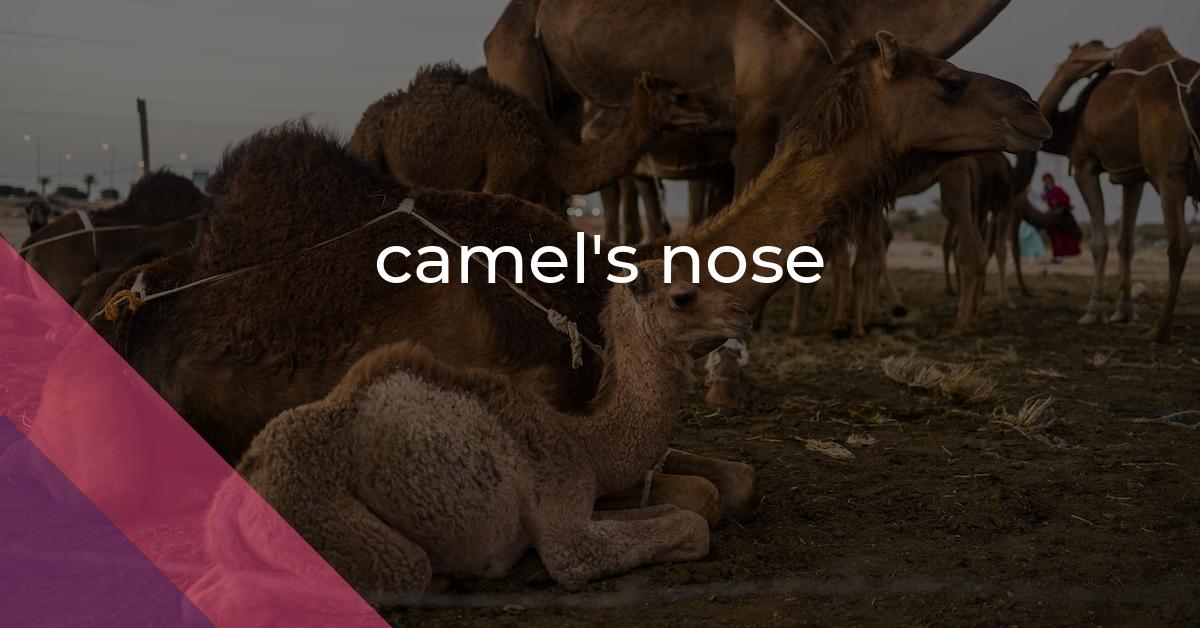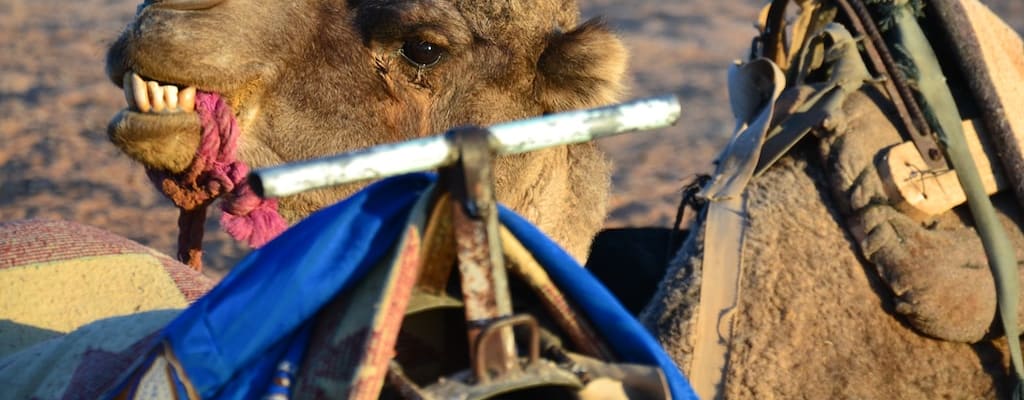camel’s nose: Idiom Meaning and Origin
What does ‘camel's nose’ mean?
The idiom "camel's nose" refers to a situation where a small, seemingly harmless request or action is allowed, which then leads to a much larger and undesirable outcome or demand.

Idiom Explorer
The idiom "sleep camel" refers to a situation where one person takes on the burden or responsibility of another person, typically out of kindness or obligation, allowing the other person to relax or avoid work. This idiom draws a parallel between the act of carrying heavy loads on a camel's back and someone taking on someone else's troubles or responsibilities.
The idiom "lead by the nose" means to control or dominate someone completely by making them do whatever you want without question or resistance.
The idiom "in front of one's nose" means that something is very obvious or easy to see but is overlooked or not noticed by someone.
The idiom "horse's ass" refers to someone who is foolish, incompetent, or makes a fool of themselves. It is often used to criticize someone's behavior or actions, implying that they are behaving stupidly or in a ridiculous manner.
The idiom *have one's wig snatched* means to be caught off guard or surprised, typically in a humiliating or embarrassing way.
The idiom "have eyes bigger than one's stomach" means to take or desire more than one can actually consume or handle.
When used informally, the idiom "go snake" means to turn against or betray someone unexpectedly and unpredictably.
The idiom "give someone an inch and someone will take a mile" means that if you give someone a small concession or opportunity, they will often try to take advantage of it and go further, often beyond what is reasonable or expected.
The idiom "give someone a bloody nose" means to physically or metaphorically harm or defeat someone, often resulting in humiliation or embarrassment to the person being targeted.
Enigmatic Intrusion
The idiom "camel's nose" is a phrase that comes from a centuries-old story in Arabian culture. It warns against allowing small requests or actions because they can lead to bigger, more undesirable consequences. This metaphor is often used to caution against giving in to initial accommodations, as they may open the door for larger and potentially problematic demands.
The story behind the idiom involves a camel seeking refuge from a sandstorm. The camel pokes its nose into the tent of its owner, who reluctantly allows it to stay for the night. However, as the night goes on, the camel gradually takes up more and more space, leaving little room for the owner. This cautionary tale highlights the danger of allowing small concessions, as they can ultimately lead to undesirable consequences.
The phrase "camel's nose" became popular in English during the mid-19th century, possibly through translation and cultural exchanges with Arabian stories and proverbs. It entered the language as a vivid metaphor that effectively conveyed the idea of unintended consequences and the need for caution.
Today, the idiom "camel's nose" is widely known and used in various contexts. It serves as a reminder to be wary of initially harmless-seeming requests or compromises. The idiom captures the concept that once a small opening is allowed, it becomes increasingly difficult to resist subsequent, more significant intrusions or demands. This cautionary metaphor warns against giving in to initial actions that may pave the way for more extensive encroachments.
The idiom "camel's nose" is similar to other idioms that convey warnings and caution. One such idiom is "camel through the eye of a needle." This idiom refers to something that is extremely unlikely or impossible. Just as it is impossible for a camel to pass through the eye of a needle, it is also impossible to prevent the undesirable consequences that come from allowing the camel's nose into the tent. It serves as a reminder of the importance of being cautious and setting boundaries.
Another related idiom is "sleep camel." This idiom refers to someone who is easily taken advantage of or manipulated. When someone allows the camel's nose into their tent, they become vulnerable to manipulation and exploitation. They become like a sleeper who is unaware of the intrusion and the potential consequences that may follow.
The idiom "lead by the nose" is also related to the concept of the camel's nose. This idiom refers to someone who is being controlled or manipulated. Just as the camel gradually took over the tent, someone who allows the camel's nose into their life may find themselves being led and controlled by the demands and actions that follow.
Lastly, there is the idiom "banana nose." This idiom refers to someone who is nosy or intrusive. When someone allows the camel's nose into their tent, they are unwittingly inviting an intrusive force into their life. They may find themselves surrounded by nosy individuals who are curious about their actions and who may further exploit them.
The idiom "camel's nose" warns against the potential consequences of initially harmless-seeming requests or actions. It serves as a reminder that once a small opening is allowed, it becomes increasingly difficult to resist subsequent, more significant intrusions. This cautionary metaphor is related to other idioms such as "camel through the eye of a needle," "sleep camel," "lead by the nose," and "banana nose" which all convey warnings and caution in different ways. These idioms remind us of the importance of being aware and setting boundaries to prevent undesirable consequences in our lives.
Example usage
Examples of how the idiom "camel's nose" can be used in a sentence:
-
I should have never let my friend borrow money from me because now he is constantly asking for more. It's like the camel's nose, once he got a little, he wants it all.
-
The company made the mistake of giving in to their employees' demands for a small pay raise. Now, the employees feel empowered and are starting to ask for more benefits. It's a classic case of the camel's nose.
-
When I agreed to babysit my niece for a few hours, I didn't expect her to stay the entire weekend. Allowing her to stay for a little while was like letting the camel's nose into the tent.
Analysis:
The idiom "camel's nose" is used to describe a situation where a small, seemingly harmless action or request is allowed, which eventually leads to a much bigger and unwanted consequence. It originates from the Middle Eastern tale where a camel convinces its owner to let its nose into the tent, but eventually takes over the entire space.
The idiom is often used metaphorically to highlight the danger of allowing or tolerating a seemingly harmless or insignificant action, as it can lead to more significant and negative consequences over time.
In the first example, the person regretted lending money to a friend because it started a pattern of the friend constantly asking for more. The initial act of lending a small amount became the camel's nose, leading to a situation where the friend expects more and more money.
In the second example, the company's decision to grant a small pay raise to its employees became the camel's nose, as it empowered the employees and led them to demand further benefits from the company.
In the third example, the person's willingness to let their niece stay for a few hours grew into a situation where the niece stayed for an entire weekend. Allowing her to stay temporarily became the camel's nose, resulting in an unexpected and extended visit.
More "Expression" idioms



